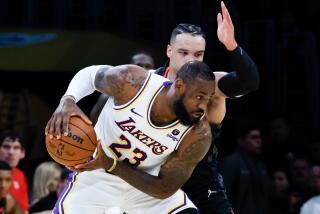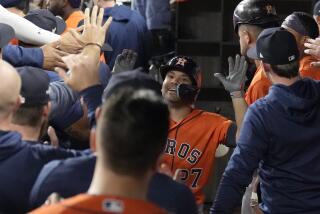Horry Powers Rockets Forward : NBA finals: Still bothered by failed Piston trade, he says Houston “wouldn’t be in this position now without me.”
- Share via
HOUSTON — He is a power forward, but not really.
He was traded away last season, sort of.
You don’t know what to make of Robert Horry? Try being the Orlando Magic, determined to figure out where this 0-2 deficit in the NBA finals came from and all too often finding him staring back.
Since Otis Thorpe was traded on Valentine’s Day and Carl Herrera dislocated his shoulder again in the first round, Horry has become the best power forward on the Houston Rockets, which is a little like being the best rabbi in Vatican City.
Make no mistake, though. Horry’s switch to power forward, while not exactly a gutsy move by Coach Rudy Tomjanovich considering the options were Pete Chilcutt, Chucky Brown and Charles Jones, has become a huge factor in the stunning start to the series as it heads into Game 3 tonight at the Summit.
Statistically, Horry has had an obvious impact: 19 points (including six of the Rockets’ 10 in overtime), eight rebounds and three steals in the opener, a 120-118 thriller; then, while struggling with his shot and getting only 11 points in Game 2, he compensated with 10 rebounds and an NBA finals-record seven steals.
But it’s more than numbers, as if seven steals by a power forward weren’t impressive enough. By using a small lineup with Horry (6 feet 10, 220 pounds) and Mario Elie (6-5, 210) as forwards, both of whom love to spot up at the three-point line like guards, Tomjanovich has created more room for Hakeem Olajuwon’s fall-aways, spins and leaners inside.
This also means Horace Grant is forced to follow his man 18 or 20 feet from the basket, greatly reducing the chances for Orlando’s power forward to help Shaquille O’Neal on Olajuwon and stretching the Magic defense in all directions. And whatever Horry surrenders to Grant in rebounding is somewhat neutralized by Horry’s ability to step into the passing lanes and force turnovers like few others at that position.
“You have to give Rudy Tomjanovich a lot of credit,” Grant said. “He’s taken me away from the basket a lot. He’s made it so I can’t double-team.”
Tomjanovich said: “I think he’s done fantastic in that role. It gives us a completely different look.”
Horry, who also likes the new role because of the freedom it allows him on offense, should be used to the adjustments. This is the same player, after all, who played small forward in his first two years at Alabama, then jumped to center as a junior when the Crimson Tide’s big men went down with injuries.
He left school as the No. 11 pick in the 1992 draft and one of only two players in Southeastern Conference history to block 100 shots in a season, O’Neal being the other. Lacking the bulk to play inside in the pros, and a sleek runner for someone 6-10, he was immediately moved back to small forward and started every game he played as a rookie.
The interruption came in the second season, 1993-94, when the Rockets, convinced that he was not aggressive or dedicated enough, traded him to the Pistons for Sean Elliott, a proven scorer. Horry reported to Detroit, received his uniform . . . and then returned to Houston a day later when Elliott flunked the physical examination because of a kidney problem.
If it became uncomfortable for the Rockets to have someone on the team they had tried to trade, Horry wasn’t about to make it any easier on them. He hung that Piston jersey in his bedroom, a reminder of what could have been. If they really do grow everything big in Texas, that apparently includes grudges.
“I feel now that the Rockets are lucky,” he said the other day. “They wouldn’t be here right now if it wasn’t for me. Sean would have been overpowered in the first series.
“I think about it all the time. That’s why I’ve got the jersey as a reminder. But that’s good. I think how lucky the Rockets are. They wouldn’t have won a championship last season without me. And they wouldn’t be in this position now without me.”
That much, everyone can figure out.
NBA Finals Notes
The Rockets set an NBA record with seven consecutive playoff road victories in the same year, but they have three of their last five possible games in Houston and are only 4-4 at home in the postseason. Psychology, anyone? “We’re going to call the Summit the O-rena,” Sam Cassell said, referring to Orlando Arena, site of the first two games. “The only difference is we’re going to wear our home uniforms at the Summit. But we have another road game.” . . . Rocket center Charles Jones, 38, who played all of 31 minutes in the regular season, has done an admirable job in 11 appearances against Karl Malone and David Robinson and hasn’t been shredded when facing Shaquille O’Neal in the finals.
More to Read
Go beyond the scoreboard
Get the latest on L.A.'s teams in the daily Sports Report newsletter.
You may occasionally receive promotional content from the Los Angeles Times.










